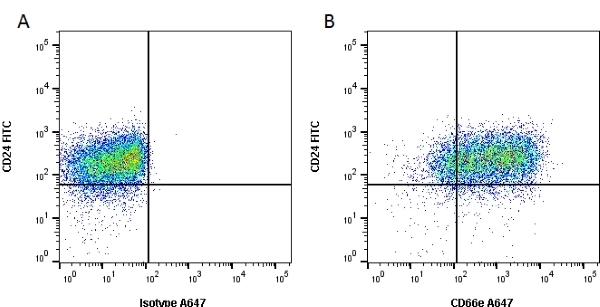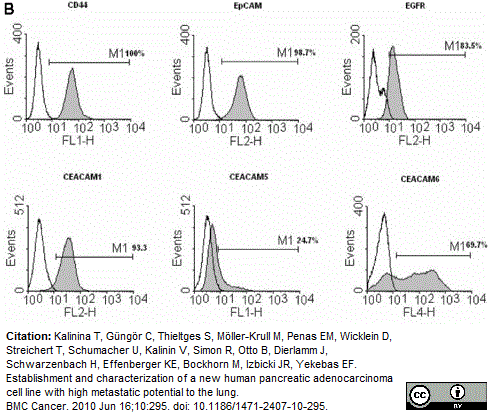CD66e antibody | C365D3 (NCRC23)


Mouse anti Human CD66e:FITC
- Product Type
- Monoclonal Antibody
- Clone
- C365D3 (NCRC23)
- Isotype
- IgG1
- Specificity
- CD66e
| Mouse anti Human CD66e antibody, clone C365D3 (NCRC23) recognizes human Carcinoembryonic antigen-related cell adhesion molecule 5, also known as CD66e, carcinoembryonic antigen, Meconium antigen 100, CEA or CEACAM5. CD66e is a 702 amino acid ~77 kDa GPI anchored membrane protein containing 7 Ig-like domains. Mouse anti Human CD66e antibody, clone C365D3 does not cross-react with normal cross-reacting antigen (CD66c), or with biliary glycoprotein 1 (CD66a) as indicated by binding assays (Price 1988, note: in this study Mouse anti Human CD66e antibody, clone C365D3 is designated as clone 6 (from author)). |
- Target Species
- Human
- Product Form
- Purified IgG conjugated to Fluorescein Isothiocyanate Isomer 1 (FITC) - liquid
- Preparation
- Purified IgG prepared by affinity chromatography on Protein A from tissue culture supernatant
- Buffer Solution
- Phosphate buffered saline
- Preservative Stabilisers
- 0.09% sodium azide (NaN3)
1% bovine serum albumin - Approx. Protein Concentrations
- IgG concentration 0.1 mg/ml
- Fusion Partners
- Spleen cells from immunised BALB/c mice were fused with cells of the mouse P3NSI myeloma cell line.
- Max Ex/Em
-
Fluorophore Excitation Max (nm) Emission Max (nm) FITC 490 525 - Regulatory
- For research purposes only
- Guarantee
- 12 months from date of despatch
Avoid repeated freezing and thawing as this may denature the antibody. Storage in frost-free freezers is not recommended. This product is photosensitive and should be protected from light.
| Application Name | Verified | Min Dilution | Max Dilution |
|---|---|---|---|
| Flow Cytometry | Neat | 1/10 |
- Flow Cytometry
- Use 10μl of the suggested working dilution to label 106 cells in 100μl
| Description | Product Code | Applications | Pack Size | List Price | Your Price | Quantity | |
|---|---|---|---|---|---|---|---|
| Mouse IgG1 Negative Control:FITC | MCA928F | F | 100 Tests |
|
Log in | ||
| List Price | Your Price | ||||||
|
|
Log in | ||||||
| Description | Mouse IgG1 Negative Control:FITC | ||||||
| Description | Product Code | Applications | Pack Size | List Price | Your Price | Quantity | |
|---|---|---|---|---|---|---|---|
| Human Seroblock | BUF070A | F | 50 Test | Log in | |||
| List Price | Your Price | ||||||
| Log in | |||||||
| Description | Human Seroblock | ||||||
| Human Seroblock | BUF070B | F | 200 Test | Log in | |||
| List Price | Your Price | ||||||
| Log in | |||||||
| Description | Human Seroblock | ||||||
References for CD66e antibody
-
Seth, J. et al. (1988) Carcinoembryonic antigen.
Lancet. 1 (8599): 1399. -
Chao, A. et al. (2006) Molecular characterization of adenocarcinoma and squamous carcinoma of the uterine cervix using microarray analysis of gene expression.
Int J Cancer. 119: 91-8. -
Stern-Ginossar, N. et al. (2007) Intercellular transfer of carcinoembryonic antigen from tumor cells to NK cells.
J Immunol. 179 (7): 4424-34. -
Kalinina, T. et al. (2010) Establishment and characterization of a new human pancreatic adenocarcinoma cell line with high metastatic potential to the lung.
BMC Cancer.10: 295. -
Soucek, K. et al. (2010) Fetal colon cell line FHC exhibits tumorigenic phenotype, complex karyotype, and TP53 gene mutation.
Cancer Genet Cytogenet. 197: 107-16. -
Ferro, F. et al. (2011) Adipose tissue-derived stem cell in vitro differentiation in a three-dimensional dental bud structure.
Am J Pathol.178: 2299-310. -
Dallas, M.R. et al. (2012) Divergent roles of CD44 and carcinoembryonic antigen in colon cancer metastasis.
FASEB J. 226: 2648-56. -
Domenis, R. et al. (2015) Adipose tissue derived stem cells: in vitro and in vivo analysis of a standard and three commercially available cell-assisted lipotransfer techniques.
Stem Cell Res Ther. 6: 2.
View The Latest Product References
-
Wicklein, D. et al. (2018) CEACAM1 promotes melanoma metastasis and is involved in the regulation of the EMT associated gene network in melanoma cells.
Sci Rep. 8 (1): 11893. -
Caponnetto, F. et al. (2020) Human Adipose-Derived Stem Cells in Madelung's Disease: Morphological and Functional Characterization.
Cells: 10 (1): 44.
- Synonyms
- CEA
- RRID
- AB_323914
- UniProt
- P06731
- Entrez Gene
- CEACAM5
- GO Terms
- GO:0005887 integral to plasma membrane
- GO:0031225 anchored to membrane
- GO:0016323 basolateral plasma membrane
MCA1744F
MCA1744FT
If you cannot find the batch/lot you are looking for please contact our technical support team for assistance.
Please Note: All Products are "FOR RESEARCH PURPOSES ONLY"
View all Anti-Human ProductsAlways be the first to know.
When we launch new products and resources to help you achieve more in the lab.
Yes, sign me up
